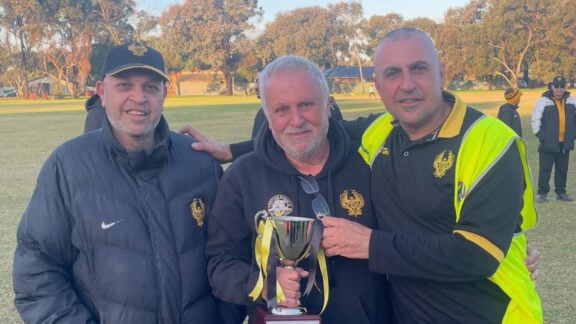A report into the state of soccer in Australia has found organisers of the A-League’s decision to ignore existing clubs and support networks had caused problems for the game.
The man who produced the report has also said that Football Federation Australia had “betrayed” soccer in Queensland by not acting to save defunct clubs North Queensland Fury and Gold Coast United.
Former Gold Coast United owner and mining magnate Clive Palmer co-founded Football Australia, the body which commissioned a public inquiry into the state of the game.
FA independent commissioner Gary Collis released a 48-page report on the inquiry’s findings in Brisbane last Thursday.
Collis, the former head of the South Australian Football Federation, said there was anger among contributors to the inquiry about the way Queensland clubs North Queensland Fury and Gold Coast United – had been treated.
“The Queensland Federation and the people of Queensland did everything that was asked of them by the FFA,” he told Grandstand.
“They set up zones, they set up development squads, they did everything that was asked on the basis of this career path, and then they (the FFA) took it away.
“In my view, the FFA betrayed the people of Queensland, and by taking away North Queensland Fury, by taking away Gold Coast United, it’s just been a disgrace.”
Collis said that people who had spoken to him had said it was positive that the game was being given a national audience on pay TV, and that the national league was a good thing.
“The real concern was the lack of democracy and accountability … with the FFA the perception is they don’t want that to happen because they’re too scared they won’t have a job,” he said.
Ignoring the history
Collis told Grandstand that the feedback from people in the football community who took part in the inquiry was that the FFA had erred in the form of the new A-League right at the start.
“Where they (the FFA) went wrong was … that when they set the new teams up, they ignored the teams that were already there like South Melbourne, the biggest club in Oceania one year,” Collis said.
“(South Melbourne) have never been contacted as far as I’m aware by the FFA.
“We had APIA (Leichhardt), South Melbourne, Heidelberg (United), we had Marconi, all these clubs had the infrastructure there, they had the supporters, had the crowds.
“But the FFA in its judgement decided to ignore all that history to set up new clubs and we’ve really been stumbling along ever since then.”
The FFA chose new franchise names and ownership groups which were not tied to existing clubs, citing a need to avoid old tensions between clubs and supporters groups in the new league.
But Collis said the FFA had ignored the nature of football leagues around the world.
“It was fractured, it was a bit tribal, and isn’t that what football’s about, tribalism?,” he said.
“When Man(chester) City plays Man(chester) United, it’s tribal.
“Whilst there were some issues to deal with, and they needed to be dealt with, I don’t think we should have wiped away the history of the game by setting up these new clubs that really play musical chairs with their owners.”
Critics have queried Football Australia and the inquiry, saying it was too closely linked with Palmer, but Collis defended his report.
“My vested interest is … I’m not on any boards, I still try to play the game, what I’ve done is to provide a report on what people have told me,” he said.
“And if they’d said we love the game, there’s nothing wrong, that’s what the report would have said.”
The report will be released to state and Federal MPs, football associations and a range of organisations.
Advertisement
FFA ‘betrayed’ South Melbourne
A report into the state of soccer in Australia has found organisers of the A-League’s decision to ignore existing clubs and support networks had caused problems for the game









